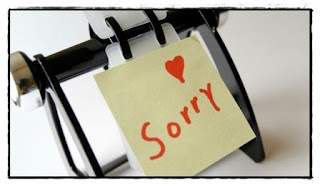 Love means never having to say you're sorry. This is a line from the novel and movie Love Story. Total nonsense. Love means that you never stop apologising!
Love means never having to say you're sorry. This is a line from the novel and movie Love Story. Total nonsense. Love means that you never stop apologising! Apology vs Anger-layers
I agree with what John Lennon said: "Love means having to say you're sorry every fifteen minutes." Nobody's perfect and we really hurt someone close to us at least once a day. Whether its unintentional or intentional doesn't matter: we hurt one another. Undealt with, these hurts can build up to become solid anger-layers inside us. This post is not about these layers. It's about building the habit of heartfelt apologies and how apologies refresh and build humble, cooperative relationships.
A heartfelt apology says: I acknowledge that I violated something about you - your beliefs, values, dignity; something you care about. A heartfelt apology doesn't have to be heavy but it has to be honest, humble and truly about reconciliation. Anyone can see a trite apology a mile off and all it does is solidify the anger of the offended party, thereby increasing the relationship rift.
Be like little children
One can see this so well in sibling-relationships in children. Sibs sometimes come close to murder but a real apology quickly restores harmony. But let one just give a dishonest "sorry"...the other one is usually quick to protest the plastic apology and the previous conflict just resumes where it was left off! It takes time to help children work through real conflict and help them to reach real resolution and forgiveness, but it always warms my heart to see how quickly a real sorry fix their relationship. Doesn't mean they won't be moving on to murder pretty quickly, but it usually is because of new issues.
As adults, we have the responsiblity to teach our children how to apologise. The most powerful way is by modelling it to them. The question then is: How often do you apologise to them for making mistakes with them? For yelling at them. Or not sharing your chocolate with them or fighting with their other parent in front of them. For swearing in traffic. For making their brother or sister cry. For losing your patience. For all the things you expect of them but not doing yourself. Children are not stupid. They are able to see when your walk and your talk doesn't match up.
Apologies prevent shame lifetraps
The thing about not apologising is that it hurts your children. They have a core need to know true boundaries, true pictures of themself. If you hurt them but don't apologise, they think they've been treated unfairly because there must be something wrong with them. That is called shame and is one of the most destructive lifetraps that a person can develop. From about the age of 8, they start to realise its not all them and they start to mistrust you and everything you try to teach them.
Just be good enough
I know it is hard to be a parent - so much that sucks you dry. Nobody expects you to be perfect, just be good enough. That means that you do the most good you can in a day and make sure it is more than the "bad". And you apologise for the "bad". Apologising helps your child to see it's not their bad that makes you upset. That you had a choice to act in an upbuilding way and you chose not to. Also that you chose to take responsiblity for your bad choices and that you are willing to humble yourself to restore the relationship. That the relationship with them is more important than your own ego or your need to feel OK about yourself.
Every time I've apologised to a child for my own unfair behaviour or words, I've been floored by their willingness to forgive. And how refreshing it was to be forgiven by their pure little hearts. I've even gone as far as phoning my nieces at night if I think back over the day and realise that I did something unfair or that I did something that I expect them NOT to do. It's humbling but it is also great to hear how happy they are that I've made the effort.
Be adult about it...
Of course, these same things apply to adult relationships as well. Unfortunately, apologies between adults are not as simple. But it has exactly the same effect: it restores peace and reconnects people. We are made for deep connections and apologies are important ways to deepen connections.
There are stacks of websites that will give you apology how2's and it bores me to rehash stuff that's already out there.
However, knowing your own apology language and that of your significant others will probably help the process. I did this online assessment and I learnt that apologies that focussed on accepting responsiblity are most meaningful to me:
You have chosen Accepting Responsibility as your primary Apology Language. What you are looking for in an apology is maturity. You most want to hear the offending party say, I was wrong and I take responsibility for my actions.I will ask others to take this questionnaire so I can also apologise to them in ways they find meaningful. I don't apologise enough and I will make an effort to do so more. Real love means that you will say sorry frequently.



3 comments:
lovely stuff!! Always enjoy your posts :) As a wife and mother I find them very helpful
thanks for this...very true. Also, i noticed that you commented on my baptism post, but it didn't come thru...glitchy, sorry. but i saw it on email, and yes, NT Wright is brialliant on the subject.
John Lennon nailed it. So did you. Well said!
:)
Post a Comment